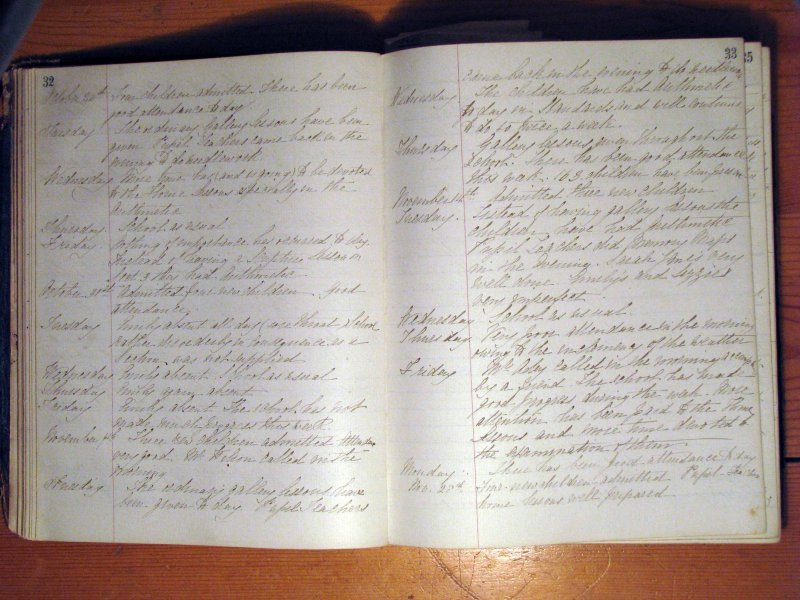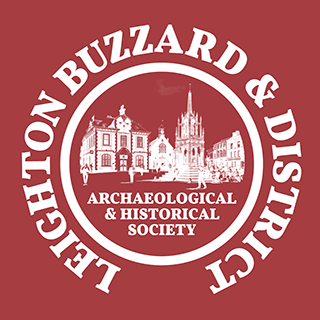Research from LBDAHS
All LBDAHS research developments and updates are posted here and are organised
by category and category articles.
Research Articles
Mary Bassett School Log
Towards the end of 2009, Leighton Buzzard Archaeological and Historical Society (LBDAHS) were privileged to be given access to a trunk of archive material held by
With the school's agreement the first book was photographed and the process of transcribing the often difficult writing begun. As well as a record of the school, it is proving to be a social commentary on the times.
Before the Education Acts of 1870 and 1880, schooling was neither compulsory nor free, so only parents who believed that education was of value would send their children to school. The fee for each child was 2d, 3d, or 4d. Often several children were paid for by a benefactor (several names occur repeatedly). Two children left 'on account of being admitted to the Union' i.e. the workhouse; another went to 'an orphanage in
What are the tales of misfortune and misery behind these statements?
In 1863, the school, with about 160 children on roll, was run by the Mistress, Eliza Jane Read, assisted by three Pupil Teachers, Sarah Jane Eames, age 15, 2nd Year, with Elizabeth Firth and Emily Elliott, both aged 14 and 1st Year. These three and their successors can be followed through various difficulties and illnesses (ranging from 'sick headaches' and colds to pleurisy and 'Congestion of the Brain'until they finally complete their four year apprenticeships and go on to further training at college, or straight into work as Assistant Mistress. After Sarah Jane Eames completed her apprenticeship in January 1867, she was replaced by Emma Garside, who, on her second day, was 'found to be very imperfect in Reading' - a little alarming for a Pupil Teacher (though she later did well)
If the Mistress was ill, the Pupil Teachers ran the school, sometimes with help from the Girls' School, as when the Mistress was away for several weeks with 'Ague'. Ague almost always means malaria, which was still present in England at the time
There was much illness and a number of deaths among the children, and there were repeated epidemics of measles. A child died in one outbreak; in a later one the school had to be closed for three weeks. Scarlet fever was common; but there are many other illnesses mentioned.
Children often did not attend when the weather was bad. The description is usually 'inclement weather', but sometimes a heavy fall of snow or a 'tremendous thunderstorm' is noted. Many of the children would not have had suitable clothing or footwear for bad weather, and could not have sat all day in wet clothes in a mostly unheated school.
They also failed to attend when 'a regiment of soldiers was in town' (April 1865 and May 1866), and might even be out blackberrying (October 9th 1865). On Rogation Monday, the children walked in procession through the town, and each received a bun at the end. Rogation days are the Monday Tuesday and Wednesday immediately before Ascension Day, and following the 6th Sunday after Easter.
We were surprised to find several children aged under 3 years on the roll; how did they cope with
School holidays had an unfamiliar pattern; Christmas might be only a week, though sometimes two (at least once, the children returned to school on Jan 1st); Easter was usually Good Friday only, and the children were in school on Easter Monday. The summer holiday 'of four weeks ' was at first in July, though later moved to August. Half day holidays seem to have been given at the Mistress' discretion, and range from the 'Club Feast' to 'Athletic Sports' ; the circus being in town; the 'opening of the new Wesleyan Chapel' to 'the marriage of Miss Bassett', and the funeral of John Dollin Bassett (when the half holiday was to enable the Mistress and the Pupil Teachers to 'follow his remains'). Oddly, no half holiday was given for the funeral of Mrs Bassett in October1866, although many children were absent because of it
Once, the key to the Bonnet Room door was lost and the Pupil Teachers had to buy a new one. Were bonnets so precious that they needed to be locked away in a room of their own, or was something else in there? We now think Bonnet Room' may be a euphemism for 'Staff Toilet'
There are about twenty years of the school and town's history in this one book.

The transcript is now complete - the sections have been collated and corrected, and a small number of copies are being printed, for LB Library, the school, the Record Office and a few other people. There will be some available to purchase from the Society. We are now working on extracting and collating as much information as we can on a number of topics, and hope to publish our results in book form in the fairly near future

